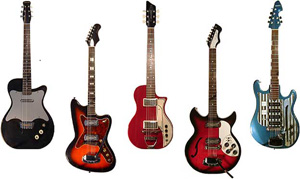
Popular Music

Popular music can generally be defined as "commercially mass produced music for a mass market" (Roy Shuker: Understanding Popular Music 2001), and most modern pop music derives from musical styles that first became popular in the 1950s. However, this definition does not address the part that popular music plays in reflecting and expressing popular culture, nor its socio-economic role, nor the fact that much of popular music does not make a profit nor does it effectively reach a mass market. It cannot easily be defined in musical terms, as it encompasses such a wide range of rhythms, instruments, vocal and recording styles.
Pop Music = Pop Culture
Popular music is also about popular culture - it shapes the way people dress, talk, wear their hair, and, some say, other behaviour such as violence and drug use. It expresses the here and now, how artists feel about what is happening in the world around them, and as such can be used as a cultural thermometer to test the temperature of the times: the protest songs of the 1960s, the punk explosion of the late 1970s, hip hop today. When advertisers or moviemakers want to evoke nostalgia for a particular place or era, they immediately turn to a pop soundtrack. Popular music can be the direct expression of the zeitgeist, especially when it is written, played and sung by performers who have strong political feelings. It can be a force for the radicalisation and empowerment of youth — and can also be blamed for "the problem with young people". Pop music has caused many a moral panic over the past few decades.
Pop Music = Social Control
Pop music is also potentially a tool for social control, partly because of its association with hypnotic rhythms, repetitive lyrics and flashing lights. What better way to drum ideology into unresisting young minds, especially when music videos can reinforce messages visually as well as aurally? The reasoning goes, that if pop music can dictate the way people dress and style their hair, it can also influence their thinking on less superficial matters. As well as being 'rebel music', pop music is also a corporate product, and who has more interest in creating generations of model consumers than the multinational media conglomerates? Even governments are seen as getting in on the act, as state control of broadcast media in places like China runs to the censorship of song lyrics.
- The Sound, not of Music, But Control—NY Times
- Lady Gaga and the New World Order—Guardian
Is Pop Eating Itself?
Pop music is a very complex cultural and media form, not least because it is so interdependent on other media and the delivery technology for its continued existence. It is a global industry still worth some $26 billion (projected for 2011), but it is also an industry with big question marks over its future, as that figure has been sliding year on year (down from $40 billion a year a decade previously), thanks to the changes wrought by the shift to digital distribution, and developments such as streaming radio. Stars who are successful by today's standards generate a fraction of the income of the stars of yesteryear, especially when it comes to touring. In 2010, 80s rockers Bon Jovi outsold everyone else when it came to concert tickets, even big name contemporary acts like Lady Gaga. It remains to be seen whether or not the music industry can sustain its conventions of success, or whether it will have to downsize expectations dramatically over the next few years.
For the latest news stories about the music industry, check out the Mediaknowall Blog.